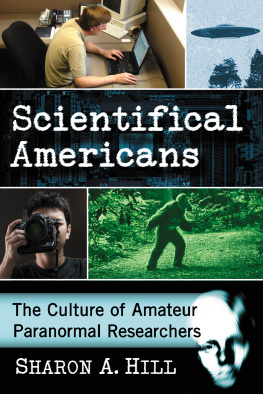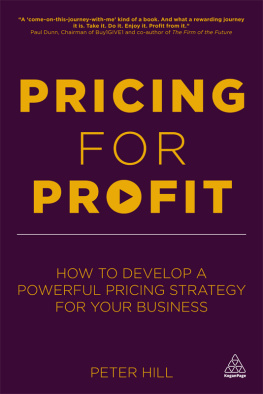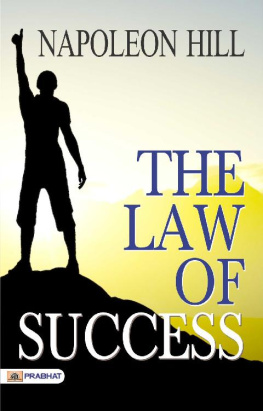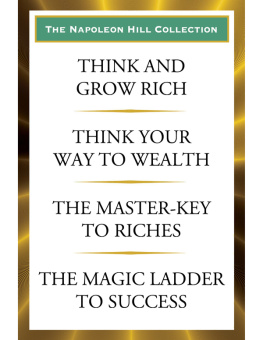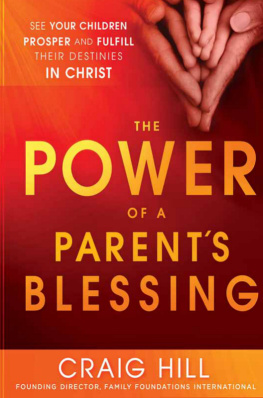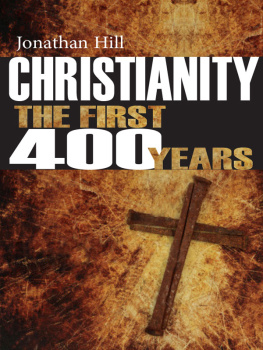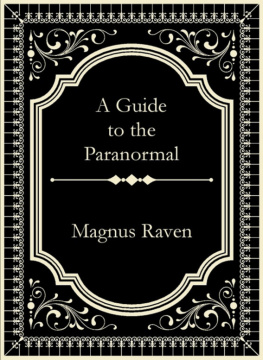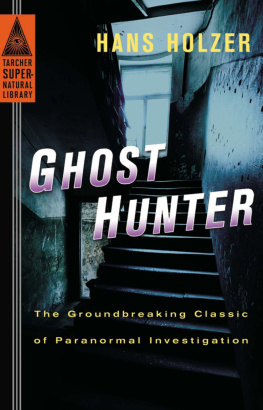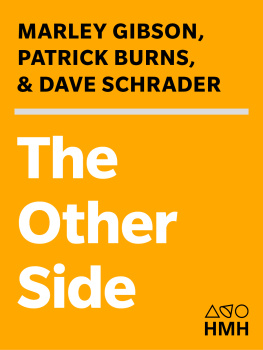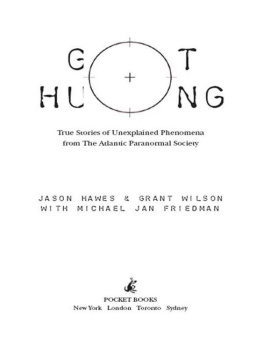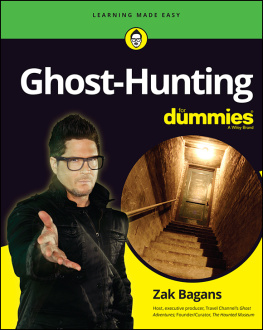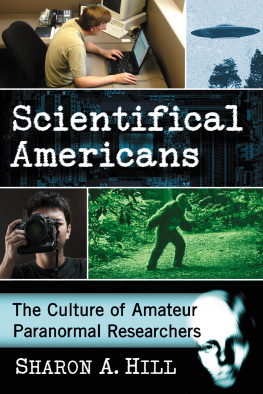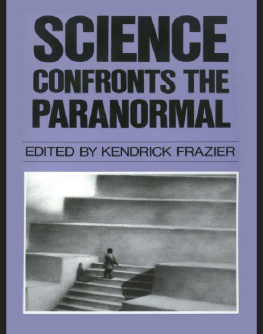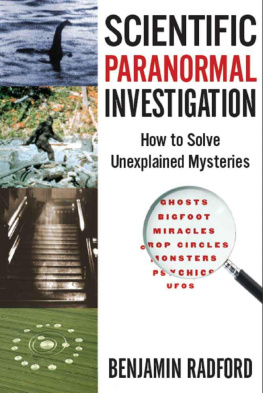
Scientifical Americans
The Culture of Amateur Paranormal Researchers
Sharon A. Hill

McFarland & Company, Inc., Publishers
Jefferson, North Carolina
LIBRARY OF CONGRESS CATALOGUING DATA ARE AVAILABLE
BRITISH LIBRARY CATALOGUING DATA ARE AVAILABLE
e-ISBN: 978-1-4766-3082-3
2017 Sharon A. Hill. All rights reserved
No part of this book may be reproduced or transmitted in any form or by any means, electronic or mechanical, including photocopying or recording, or by any information storage and retrieval system, without permission in writing from the publisher.
Front cover images 2017 iStock
McFarland & Company, Inc., Publishers
Box 611, Jefferson, North Carolina 28640
www.mcfarlandpub.com
Acknowledgments
I want to express deepest thanks to those who contributed in inexpressible ways to the completion of this project, with special acknowledgment of the following: my family; personal supporters and patrons of DoubtfulNews.com; Kenny Biddle for being Awesome; Ron Bolton for the invitation to Fort Mifflin; Jeb Card for countless suggestions, information, and advice; Jason Korbus and Bobby Nelson; Sharon and Matt Madison; Chip and Grace Denman for use of a much-needed quiet retreat; Torkel degrd; Ben Radford; and Jim Veihdeffer for proofreading and editing suggestions.
Preface
As a skeptic who has not found compelling evidence for the paranormal, yet remains fascinated by these subjects, Im often asked how I ended up researching and writing about strange claims and the people who investigate them. The short answer is that I love the idea of ghosts, Bigfoot, and UFOs. I expect I always will.
My childhood was rife with media on paranormal subjects. The first books I chose for myself were on haunted houses and monsters. I was an avid viewer of the real-life mini-documentary TV show In Search Of hosted by Leonard Nimoy. I accepted that Bigfoot and the Loch Ness Monster were out there waiting for us to find. I read and wrote ghost stories hoping I would get to experience this phenomenon myself someday. Alien visitation viscerally terrified me and demon possession was about the scariest thing I could imagine. In later years, influenced by scientific training and skeptical literature on these topics, I lost my confidence that these claims were as witnesses concluded. Eventually, I realized that they were still interesting but in a new way. Reports of paranormal phenomena are worthy of serious research if only because they are so ubiquitous and influential in human experience. Whether the cause is in our minds or out of this world, paranormal experiences profoundly affect the people who have them. The event can change a life for better or worse.
I cant recall when I noticed the glossing of paranormal discussion with sciencey-sounding concepts. Such language had always been there. Realization that symbols of science were a key part of portraying paranormal investigation and that non-scientists were claiming a scientific role dawned on me gradually as I became personally and professionally involved in the public understanding of science. Feel free to categorize me as a science cheerleader since I am not quiet about recognizing the great accomplishments derived from scientific research. Yet, I understand that science is done by people who arent flawless or unbiased. Scientists are not better people than non-scientists, but as with any other profession, practicing scientists acquire different skills and experience beyond that of most amateurs. Science is a discipline, not a hobby. Even though science is not perfect, it still is superbly useful and there is no justification for non-experts to usurp earned authority of professionals.
Admittedly, the public does not have easy access to the insider beat of science or the depth of technical knowledge to understand the foundation of scientific consensus on a subject and make a fully-informed judgment on many technical topics. Instead, they rely on medias balanced presentation of the story which, unfortunately, often includes equal space for enthusiastic but mistaken supporters of a scientifically untenable, wrongheaded idea. Many people are impressed with the seemingly sophisticated language and imagery used by non-scientific amateurs, but attempts to fake scientific credentials are often blatantly obvious to anyone who is familiar with science. They are not being scientific in their explanations, they are being scientificala word I use in this volume to connote the attempt to be scientific without achieving it. This book confronts sham inquiry and pseudoscience of paranormal protocols and concepts as followed by many modern researchers.
Individual and social belief and practice regarding the supernatural, paranormal, and the mystical is found in every society and culture. The term paranormal, so popular in American entertainment in the early twenty-first century, evokes the discussion in this volume of the complex and nuanced view American society has about scienceas an authority, an icon, an image, a mindset, a community, a mission, a gimmick, or a scapegoat. Uncritical acceptance of paranormal explanations may ultimately lead to invoking other mistaken beliefs or result in faulty conclusions, it can cause unhealthy fear and distress, and it may distract from responsibilities of real life and real problems to be solved. Ignoring this important topic would be, paradoxically, unscientific.
Repeated surveys consistently demonstrate that paranormal belief is common among at least half of the U.S. population, that this has remained so over many decades, that it is a reoccurring and important theme in popular culture, and that it is part of the human experience to entertain thoughts regarding that which may be beyond our mundane daily environment. Per the Baylor Religion Surveys of 2005 and 2007, more than half of Americans say they have researched at least one paranormal topic. The alleged prophecies of Nostradamus, for example, is an extremely popular subject as many people find the idea of a historical psychic seer who advised great leaders of his time as romantic and mysterious. Ghosts, UFOs, and cryptids (hidden animals) are close behind (Bader et al. 2010). Weve all read some book or article or watched a documentary about these topics at some time in our lives and wondered how much of it was true. If you believe the extraordinary claims are or could be true, you are far more likely to seek out more information about them. In Paranormal America, Bader, Mencken, and Baker (2010) see indications that paranormal belief will likely continue to grow in the United States. View the expanded cable selection on television on any night and odds are you will find a program depicting paranormal investigation.
Media coverage and television popularity alone suggests that paranormal investigation is trendy. There are many possible reasons why this is so. No doubt some get a rush at the thought of facing scary situations. People frequently participate in paranormal investigation activities to satisfy personal curiosity about an unsettling experience they have had themselves. Socializing with like-minded people who appreciate the same esoteric subjects is enjoyable. Or, a person may find an ego boost by being part of something that science cant solve. Participation in an investigation like those depicted on TV empowers an individual. Viewers see it being done on TV and think, Hey, I can do better than that or That looks like fun. Involvement in fringe activities could be as simple as escaping the drudgery of daily life and finding novelty in the mundane (Sagan 1972). In a more philosophical sense, Molle and Bader (2013) suggest that the lack of control and involvement people have with modern technology and complicated science results in the embedding of these difficult concepts into structures they feel they can control and participate in, such as ghost hunting.
Next page
